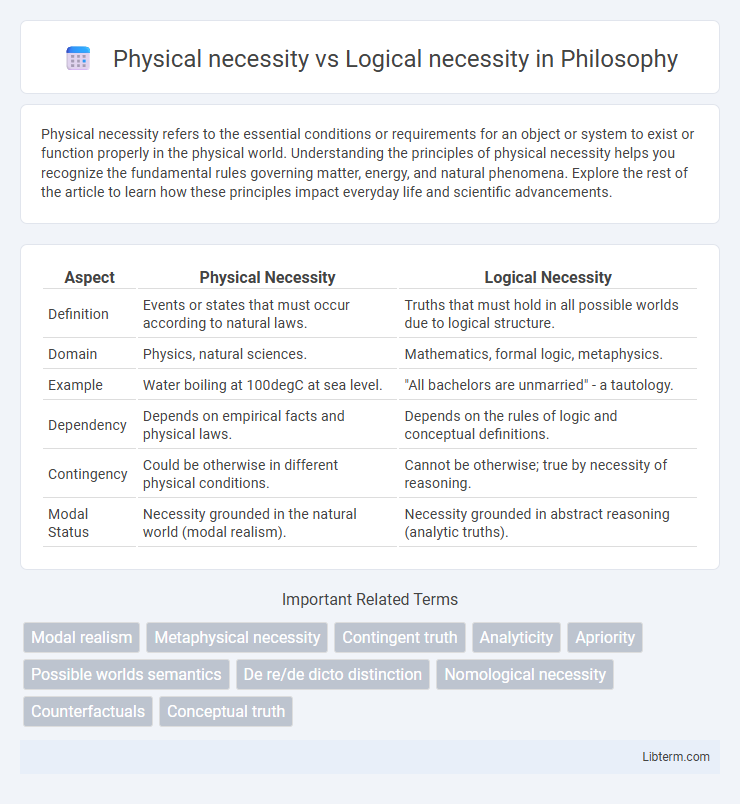Physical necessity refers to the essential conditions or requirements for an object or system to exist or function properly in the physical world. Understanding the principles of physical necessity helps you recognize the fundamental rules governing matter, energy, and natural phenomena. Explore the rest of the article to learn how these principles impact everyday life and scientific advancements.
Table of Comparison
| Aspect | Physical Necessity | Logical Necessity |
|---|---|---|
| Definition | Events or states that must occur according to natural laws. | Truths that must hold in all possible worlds due to logical structure. |
| Domain | Physics, natural sciences. | Mathematics, formal logic, metaphysics. |
| Example | Water boiling at 100degC at sea level. | "All bachelors are unmarried" - a tautology. |
| Dependency | Depends on empirical facts and physical laws. | Depends on the rules of logic and conceptual definitions. |
| Contingency | Could be otherwise in different physical conditions. | Cannot be otherwise; true by necessity of reasoning. |
| Modal Status | Necessity grounded in the natural world (modal realism). | Necessity grounded in abstract reasoning (analytic truths). |
Introduction to Physical and Logical Necessity
Physical necessity refers to propositions that are true based on the laws of nature and empirical facts, such as water boiling at 100degC under standard atmospheric pressure. Logical necessity involves truths that are true by virtue of their logical form, like "all bachelors are unmarried men," which holds regardless of physical circumstances. Understanding these concepts is crucial in distinguishing between truths grounded in empirical reality and those derived purely through logical reasoning.
Defining Physical Necessity
Physical necessity refers to truths that depend on the laws of nature and the actual state of the physical world, meaning certain events or conditions cannot be otherwise given these constraints. It contrasts with logical necessity, which pertains to truths that hold in all possible worlds by virtue of their logical form alone, such as mathematical or tautological statements. The distinction highlights that physical necessity is contingent on empirical facts and natural laws, whereas logical necessity is independent of empirical reality.
Understanding Logical Necessity
Logical necessity refers to statements or propositions that must be true in all possible worlds due to their logical form, such as mathematical truths or tautologies. Understanding logical necessity involves recognizing that these truths do not depend on empirical facts but on the principles of logic and reasoning. Unlike physical necessity, which depends on natural laws and observable phenomena, logical necessities are invariant across any conceivable scenario.
Key Differences Between Physical and Logical Necessity
Physical necessity refers to conditions or truths that depend on the laws of nature and could be otherwise if natural laws were different, such as water boiling at 100degC at standard atmospheric pressure. Logical necessity involves truths that cannot be denied without contradiction, such as mathematical statements or tautologies like "all bachelors are unmarried." The key difference lies in physical necessity being contingent on empirical facts, whereas logical necessity is based on principles of logic and cannot be contradicted in any possible world.
Examples of Physical Necessity in Science
Physical necessity in science refers to phenomena constrained by the laws of nature, such as the necessity for water to boil at 100degC at standard atmospheric pressure. Another example includes the collapse of a star into a black hole once it surpasses the Tolman-Oppenheimer-Volkoff limit due to gravitational forces. These instances highlight conditions that must occur given physical laws, unlike logical necessity based on abstract reasoning.
Illustrative Cases of Logical Necessity
Logical necessity arises when a proposition is true in all possible worlds due to its form or meaning, such as "All bachelors are unmarried men." Illustrative cases include tautologies like "If p, then p," which must hold true under any interpretation, highlighting the inherent truth value independent of empirical facts. These examples contrast with physical necessity, which depends on the laws of nature, demonstrating how logical necessity is grounded in conceptual coherence rather than physical reality.
The Role of Laws of Nature and Logic
Physical necessity arises from the immutable laws of nature governing phenomena such as gravity and thermodynamics, determining what must happen in the physical world. Logical necessity is dictated by the principles of logic and mathematics, ensuring truths based on formal systems and valid inference. The laws of nature underpin empirical constraints, whereas logical laws define conceptual truths independent of empirical reality.
Philosophical Implications of Each Type
Physical necessity refers to conditions or events that cannot be otherwise due to the laws of nature, grounding them in empirical reality and influencing metaphysical discussions on determinism and causality. Logical necessity involves truths that hold in all possible worlds by virtue of their form or meaning, shaping debates in modal logic and the nature of truth. Philosophically, physical necessity challenges notions of free will and contingency, while logical necessity addresses the structure of reasoning and the limits of conceptual frameworks.
Challenges and Controversies
The distinction between physical necessity and logical necessity raises critical challenges in metaphysics and epistemology, particularly regarding the basis for asserting necessity claims. Physical necessity depends on laws of nature and empirical conditions, often leading to debates over the scope and stability of such laws across possible worlds. Logical necessity, grounded in tautologies and logical truths, faces controversies around its application to contingent realities and the limits of formal systems in capturing all necessary truths.
Conclusion: Bridging Physical and Logical Necessity
Physical necessity refers to constraints dictated by the laws of nature, such as gravity or thermodynamics, while logical necessity concerns truths that arise from reasoning and logical consistency, independent of empirical reality. Bridging physical and logical necessity involves examining how physical laws can be understood through logical frameworks, enabling a unified interpretation of necessity that respects both empirical evidence and rational principles. This integration supports advancements in fields like metaphysics, philosophy of science, and artificial intelligence, where understanding different modalities of necessity enhances theoretical and practical applications.
Physical necessity Infographic

 libterm.com
libterm.com